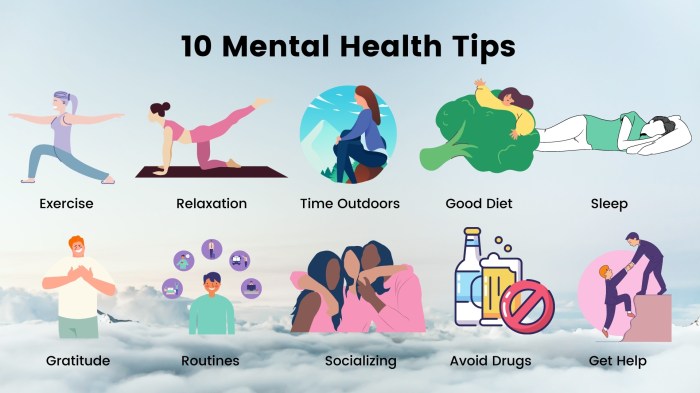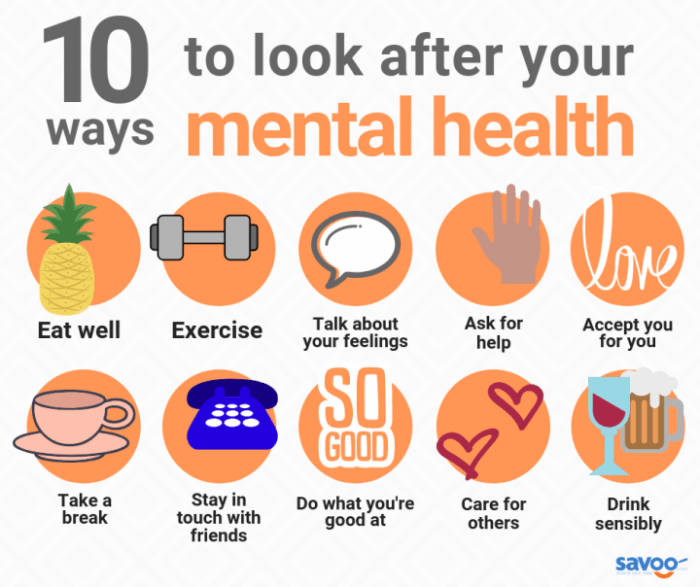Mental Wellness Tips: Let’s dive into the world of mental well-being and discover effective strategies to boost your overall health and happiness. From self-care practices to stress management techniques, this guide has got you covered for a thriving mind and body.
Importance of Mental Wellness
Mental wellness is crucial for overall well-being as it encompasses our emotional, psychological, and social well-being. It affects how we think, feel, and act, and plays a significant role in how we handle stress, relate to others, and make choices in our daily lives.
Impact on Daily Life
- Mental wellness influences our decision-making process, affecting our choices in relationships, career paths, and lifestyle habits.
- Poor mental wellness can lead to increased stress, anxiety, and depression, impacting our ability to function effectively in our daily tasks.
- Strong mental wellness can enhance our resilience and coping mechanisms, helping us navigate challenges and setbacks with a positive mindset.
Connection to Physical Health
- Research shows that mental wellness is closely linked to physical health, with conditions like depression and anxiety increasing the risk of chronic illnesses such as heart disease, diabetes, and autoimmune disorders.
- Practicing self-care, mindfulness, and stress management techniques can improve mental wellness and contribute to better physical health outcomes.
- Physical exercise is not only beneficial for the body but also for mental wellness, as it releases endorphins that boost mood and reduce symptoms of anxiety and depression.
Self-Care Strategies

Taking care of yourself is crucial for maintaining good mental wellness. Self-care practices can help you manage stress and anxiety, improve your mood, and enhance your overall well-being.
Establish a Routine
Creating a daily routine that includes activities you enjoy and that promote relaxation can significantly impact your mental health. Whether it’s reading a book, exercising, meditating, or spending time with loved ones, make sure to prioritize self-care activities in your schedule.
Practice Mindfulness
Mindfulness involves being fully present in the moment and paying attention to your thoughts and feelings without judgment. Engaging in mindfulness practices such as deep breathing exercises, yoga, or mindful walking can help reduce stress and anxiety levels.
Set Boundaries
It’s essential to establish boundaries to protect your mental well-being. Learn to say no to things that drain your energy or cause unnecessary stress. Setting boundaries with work, relationships, and social commitments can help you prioritize your needs and maintain a healthy balance.
Stay Active
Physical activity has numerous mental health benefits, including reducing anxiety and improving mood. Incorporate regular exercise into your routine, whether it’s going for a walk, jogging, dancing, or practicing yoga. Find activities that you enjoy and make them a regular part of your self-care routine.
Connect with Others, Mental Wellness Tips
Social connection is vital for mental wellness. Make an effort to stay in touch with friends and family, join a support group, or participate in community activities. Building strong connections with others can provide emotional support, reduce feelings of loneliness, and boost your overall well-being.
Healthy Lifestyle Habits

Eating right, staying active, getting enough sleep, and fostering social connections are all key components of a healthy lifestyle that can significantly impact your mental wellness.
Diet and Exercise
- Eating a balanced diet rich in fruits, vegetables, whole grains, and lean proteins provides essential nutrients for brain function and overall well-being.
- Regular physical activity releases endorphins, the “feel-good” hormones, reducing stress and anxiety levels, and improving mood.
- Exercise also promotes better sleep, boosts self-esteem, and enhances cognitive function, all of which contribute to better mental health.
Good Sleep Hygiene
- Establishing a consistent sleep schedule and creating a relaxing bedtime routine can improve the quality of your sleep.
- Adequate rest allows your brain to recharge, process emotions, and consolidate memories, supporting mental clarity and emotional resilience.
- Poor sleep habits can lead to mood disturbances, decreased cognitive function, and increased risk of mental health disorders.
Social Connections
- Strong social ties provide emotional support, reduce feelings of loneliness, and increase feelings of belonging and purpose.
- Engaging in meaningful interactions with friends, family, or community members can boost self-esteem, improve mood, and enhance overall mental well-being.
- Isolation and loneliness, on the other hand, have been linked to increased risk of depression, anxiety, and other mental health issues.
Stress Management Techniques: Mental Wellness Tips
Feeling overwhelmed by stress is a common experience, but it’s important to have effective strategies to manage it. By incorporating mindfulness and creating a stress-free environment, you can improve your mental well-being and overall quality of life.
Mindfulness and Stress Reduction
Mindfulness involves being fully present in the moment and focusing on your thoughts and feelings without judgment. This practice can help reduce stress by allowing you to acknowledge your emotions and reactions without becoming overwhelmed by them.
- Practice deep breathing exercises to center yourself and calm your mind.
- Engage in meditation or yoga to promote relaxation and reduce stress levels.
- Take short breaks throughout the day to check in with yourself and practice mindfulness.
- Focus on gratitude and positive thinking to shift your perspective and reduce stress.
Creating a Stress-Free Environment
It’s essential to create a supportive environment that promotes relaxation and minimizes stress triggers. By making small changes to your surroundings, you can cultivate a more peaceful and stress-free space.
- Declutter your living or work area to reduce visual distractions and create a sense of calm.
- Incorporate soothing scents like lavender or eucalyptus through candles or essential oils.
- Establish a daily routine to provide structure and stability in your day-to-day life.
- Surround yourself with positive influences and supportive relationships that uplift and encourage you.
